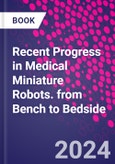Recent Progress in Medical Miniature Robots: From Bench to Bedside serves as a
specialized and dedicated reference on miniature robots and their related biomedical
applications. This book presents the latest achievements in the research of miniature
robotics and introduces a variety of miniature robots on the milli-/micro-/nano-scale, with
tethered/untethered and individual/swarm designs, describing the various types and
analyzing the underlying principles per class. Recent Progress in Medical Miniature Robots:
From Bench to Bedside is suitable for clinicians, academicians, healthcare professionals,
researchers, students, engineers, and scientists working in the field of medical miniature
robots and related biomedical applications.
Please Note: This is an On Demand product, delivery may take up to 11 working days after payment has been received.
Table of Contents
1. Flow-assisted and flow-driven endovascular medical instruments
2. Magnetically controlled continuum miniature robot
3. Magnetic guidewire/catheter for endovascular treatment
4. A new drive system for microagent controls in targeted therapy based on rotating gradient magnetic fields
5. Innovation in microrobotics for the treatment of Asherman’s syndrome: A perspective study
6. Design and fabrication of a magnetic actuation miniature soft robot for biological sampling
7. Functionalization of microrobots for biomedical applications
8. Clinical imaging of miniature robots in relevant biological scenarios
9. Magnetic microrobots from individual to collective steering
10. Sperm-micromotors for assisted reproduction and drug delivery
11. Untethered microrobots for minimally invasive removal of blood clots
12. Micro-/nanorobots for combating biofilm infections
13. Magnetic actuation of flexible and soft robotic systems for medical applications
14. In vitro diagnostics via micro/nanorobotic platform
Authors
Li Zhang Professor, Department of Mechanical and Automation Engineering and Professor by courtesy, Department of Surgery at the Chinese University of Hong Kong (CUHK). Li Zhang is a professor at the Department ofMechanical and Automation Engineering and
a professor by courtesy at the Department of
Surgery at the Chinese University of Hong
Kong (CUHK). He is a director at the
SIAT-CUHK Joint Laboratory of Robotics
and Intelligent Systems, and a group leader
in the Multi-scale Medical Robotics Center
(MRC), InnoHK, at the Hong Kong Science
Park. Dr. Zhang's research interests include
small-scale robotics and biomedical applications.
He is elected as FIEEE, FRSC, FAAIA,
FHKIE, a member of the Hong Kong Young
Academy of Sciences, and an Outstanding Fellow
of the Faculty of Engineering at CUHK. Philip Wai Yan Chiu Dean, Faculty of Medicine, Shun Hing Education and Charity Fund Professor of Robotic Surgery, CUHK, Director of MRC and Chow Yuk Ho Technology Centre for Innovative Medicine of CUHK. Philip Wai Yan Chiu is currently the Dean of
the Faculty of Medicine, Shun Hing Education
and Charity Fund Professor of Robotic Surgery
at CUHK, and the Director of MRC
and Chow Yuk Ho Technology Centre for
Innovative Medicine of CUHK. He is also
the Director of Endoscopy at Prince of Wales
Hospital and the New Territories East Cluster
of the Hong Kong Hospital Authority. His
research interests include minimally invasive
robotic esophagectomy, novel endoscopic
technologies for the diagnosis of early GI cancers,
endoscopic surgery, and robotics for
endoluminal surgery. Kai Fung Chan Research assistant professor, Chow Yuk Ho Technology Centre for Innovative Medicine and MRC, CUHK. Kai Fung Chan is a research assistant professor
at the Chow Yuk Ho Technology Centre
for Innovative Medicine and MRC of CUHK.
His research interests include medical miniature
devices, micro-/nanorobotics, and translational
medicine. He is also a co-founder
of three start-up companies that are related
to in vitro diagnostic devices, miniature medical
devices, and medical microrobotic
technologies.








